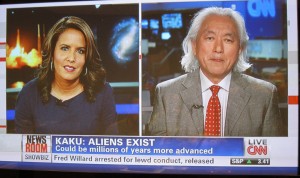Theoretical physicist Michio Kaku must be a fairly smart guy in some respects. After all, he is a Professor of Theoretical Physics in the City College of New York. What he had to say yesterday on CNN was idiotic, however, and to the extent that he demeaned the scientific method , he should be ashamed for making all scientists look like buffoons.
I just happened to see a CNN “news” show as I was preparing lunch yesterday at my workplace kitchen (there is a TV hanging on the wall). At the end of one news segment, it was announced that we should stay tuned because there is new evidence of an ancient galaxy indicating that there are advanced civilizations living on other worlds. What??? This announcement immediately sent up red flags. I asked co-workers, “Who is the crackpot who is going to make these claims?” After the commercial ended, we met the crackpot: Michio Kaku.
What was evidence that Aliens exist? According to Kaku, it is the fact that that scientists have successfully been using the Kepler satellite to detect the existence of planets in our region of the Milky Way Galaxy. Already, scientists have detected the existence of more than 2,000 planets outside of our solar system. Well, it is true that we are discovering thousands of planets outside of the solar system. It is an exciting development. Actually, it is an amazing development based on rigorous and legitimate science.
It was at this point in the broadcast that the conversation turned surreal. Since many planets have been detected (something that has been assumed for many decades), Kaku asserted that there must be many civilizations out there, and some of them are highly advanced, much more advanced than we are here on earth. How does Kaku know this? He doesn’t say.
I should stop for a moment to reveal my gut feeling (which is merely a gut feeling). I assume that there are billions of planets in our galaxy, and that many of them sustain rudimentary forms of life. I also assume that some of them are inhabited by sentient beings of some sort, perhaps beings with whom we could communicate if only we weren’t so far away that electromagnetic wave communications would take hundreds or thousands of light years to reach them–I assume that if such sentient beings exist, many of them don’t have the technology to communicate with us through space. Thus, I’m not belittling Kaku for assuming that there might be such beings and civilizations; there are some good reasons for making such an assumption. Rather I’m belittling him for appearing on TV as a scientist and asserting that such beings and civilizations actually do exist, and that we can somehow base this conclusion on Kepler’s data. But this rampant speculation disguised as science was merely the launching point for some intensely xenophobic pseudo-science.
The conversation then turned to whether these other advanced civilizations are plotting against us. Kaku suggested that some of those alien civilizations likely have advanced weapons that they might use to destroy us. He argued that it would be “Bambi v Godzilla,” because we are so much less intelligent than they are. We would be helpless against their technology, because they are so much smarter. Then he held out some hope: Perhaps the threat from this common enemy, these aggressors from out space, will lead the nations of Earth to cooperate as never before, as we struggle against them.
To summarize the argument: We can detect the existence of more than 2,000 planets outside of the solar system, THEREFORE, some hostile aliens are out there and they would seek to overwhelm us with their hyper-intelligently designed weapons. This is like saying that because we discovered bacterium in the human digestive system, they will, within 2 years, evolve into a giant worm that will crawl up our abdomens and devour our hearts. This is rank speculation upon rank speculation.
Gad.
We’ve already got too much bad science all over the airwaves in the form of groundless nutrition claims, quack medicine, intentional industry-driven lies regarding alleged food safety, the denial of global warming, and claims that we there is such a thing as “clean coal” technology. We don’t need more junk science on TV. Such groundless “scientific” claims put all scientists in a bad light at a time when we desperately need more evidence-based rigorous thinking to solve potentially insurmountable

issues relating to human survival.
This CNN “news” show featuring Michio Kaku (and a naive “news” host who could have and should have punctured Kaku’s wild claims with a good question or two) is a good example of the drivel that often passes for news these days. What the networks often feed us are freak shows, charlatans, conjured conflict (conflict pornography), entertainment, horse race politics, pundits arguing in the absence of facts, and politicians and their shills energetically shitting on each other.
We don’t need any more attention-craving reality-unhinged “scientists” who use their credentials as a basis for spouting nonsense or paranoia. There is a constant and notable lack of credible information presented on “news” shows, and this leaves leaves many viewers suspicious of all scientists. Instead of trusting science, then, many people conclude that any belief is as good as any other belief. Science versus religion? It’s all the same, right? Just pick one willy-nilly and you’ll be fine. Broadcasting goofball science as though it were rigorous science is making it difficult for our country to set meaningful priorities, and that is a national tragedy.
Next time CNN wants to have Kaku discuss the impending attacks by belligerent aliens, they should introduce him like this:
Professor Kaku has a science degree and a job as a professor, but nothing he is about to say is scientific. He is here to act like a comedian or a clown, akin to Dr. Science and nothing more.



Bummer, this guy was someone I had admired.
Erich-
I assume that you are wearing your standard skeptic suit when attacking Kaku’s claims here. But he’s not the only legendary physicist to make these sorts of claims– Stephen Hawking said much the same thing in 2010.
It doesn’t seem so wildly improbably to me, either Kaku’s claims or Hawking’s. Even if we stipulate the odds of such life is extremely low, the mind-boggling scale of the univers means that there’s probably room to meet the odds. Just my 2 cents.
Brynn: Based on much that I have read, I don’t doubt that there could be sentient life all over the universe–even if one out of a billion planets has sentient life, that’s a lot of sentient life. Nor do I doubt that there might be quite a few planets with technologically savvy sentient life. This assumes that whatever it was that allowed evolving life forms to first exist on Earth pertains also to other planets, which presumably have the same or similar laws of physics that we have here on Earth.
Until sentient life is actually detected on at least one other planet, though, all we are left with is speculation, and the Drake Equation, which guides our speculation. What I oppose is wheeling out a scientist to offer wild speculation in the absence of any science to back it up. There are no facts to back up Kaku’s War of the World’s warnings. Given the vast distances between planets and Einstein’s special theory of relativity (which caps the possible speeds at which vehicles can travel), it would be an extraordinary feat for one world’s sentient life forms to physically visit another planet populated with sentient life forms. And if it ever happened, would the first ship that reached Earth really be an armed battleship? To me, Kaku is peddling xenophobia run rampant, not science.
In this video, Carl Sagan discusses the Drake equation. Notice the tone of the presentation, and the fact that Sagan’s numbers are clearly presented as speculation, though guided by science:
Thanks Erich. I’m familiar with the Drake equation and respect your frustration at Kaku’s broadcast. But it seems to me that Kaku’s essentially saying the same thing as Sagan and Drake, but adding one or two more variables at the end of the equation: the percentage of planets carrying life sentient and sufficiently advanced to physically reach Earth that are likely to be friendly to us.
I guess I just interpreted his broadcast differently, I thought he was clear as to some of the base assumptions he was making. Given the infinite number of stars in the universe, some are bound to carry life forms; once we assume that, any that are capable of reaching earth are, by definition, massively more technologically advanced than us. Will they be friendly? I think he equivocates a little bit here, but explains good reasons for believing either side. CNN perhaps was not so careful with their definitive scroll “Aliens exist”. I count 11 uses of the word “if”, 3 uses each of “might” and “could”, several “probably”s and a number of other such phrases that I thought made it clear it was speculation. Once he explains the setup for his assumptions though, he does switch to a more definitive “would”, so that could explain it also.
I think perhaps part of the problem lies in the medium rather than the message. Kaku’s video was 2 minutes 50 seconds long, and several of those precious seconds were taken up by the host asking questions. But such is modern TV in America. Sagan’s presentation was much more in-depth and gave him significantly longer to fully explain his assumptions (and the huge effect changes to any of the variables can have).
I guess I’m just saying that two of the Earth’s preeminent theoretical physicists are saying essentially the same thing, and in essentially the same terms. Quoting again from my link to Stephen Hawking above:
Compare that metaphor to Kaku’s use of an anthill metaphor, both are implying the meeting of one extremely advanced civilization with a much more primitive one. I don’t know if it’s good science or not, but this is their field, I want to give them the benefit of the doubt.
Here is another thing to consider:
Commercial Radio broadcasts began a little over 100 years ago, followed shortly by AC power distribution
So any intelligent ETs = may have already taken notice.
Now let’s assume they have decoded our radio and tv modulation methods, and they have been watching and listening to us for decades.
Even if they have the ability to travel to Earth, why would they? Wouldn’t they be afraid of catching “Painful Rectal Itch” or some similar disease.
Michio Kaku strikes again:
http://www.preposterousuniverse.com/blog/2013/03/18/what-the-god-particle-hath-wrought/
Just for the record, it seems likely that the original blogger actually missed the true purpose or at least subtext of Kaku’s statments: to illustrate the benefits of “cooperation”, aka to promote pacifism/collectivism. Kaku’s speculation is functionally similar in this regard to many pronouncements of, for example, global warming proponents. They might not be actually proveable or supportable, but they tend to make ordinary people think and act “correctly.”